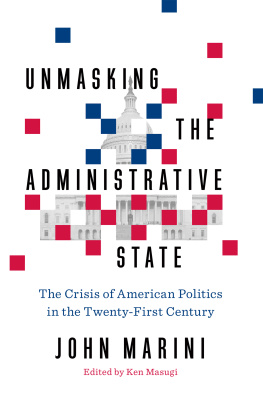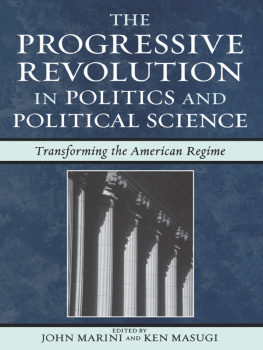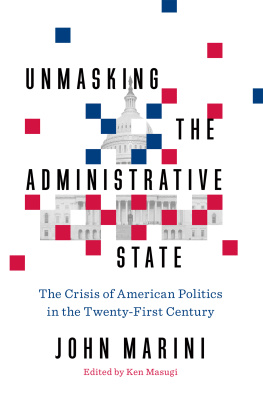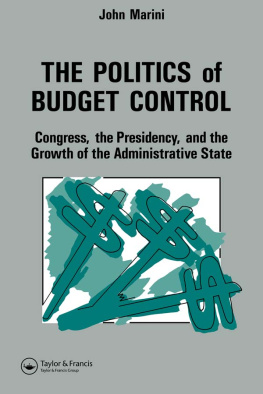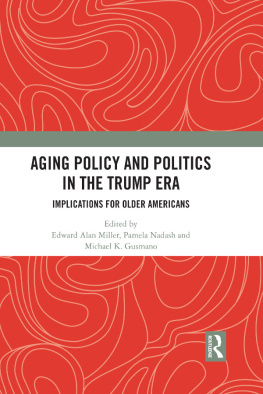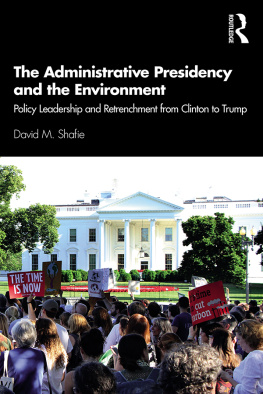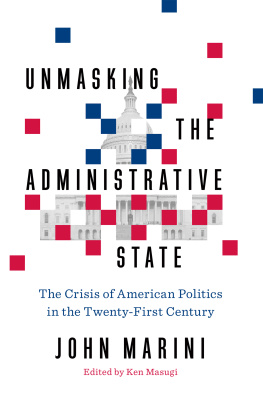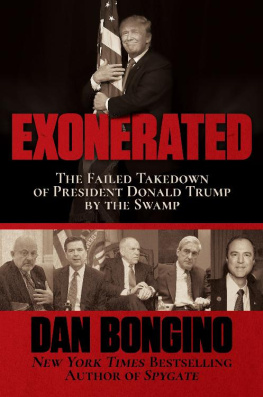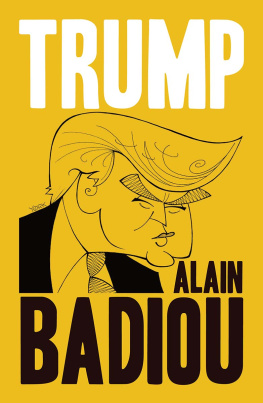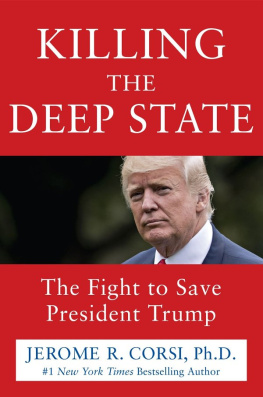
UNMASKING
THE
ADMINISTRATIVE
STATE
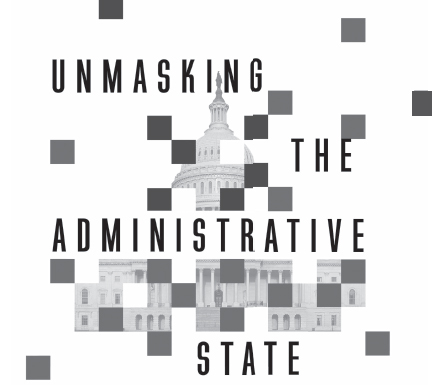
The Crisis of American Politics in the Twenty-First Century
JOHN MARINI
Edited by Ken Masugi

New York London
2019 by The Claremont Institute
All rights reserved. No part of this publication may be reproduced, stored in a retrieval system, or transmitted, in any form or by any means, electronic, mechanical, photocopying, recording, or otherwise, without the prior written permission of Encounter Books, 900 Broadway, Suite 601, New York, New York, 10003.
First American edition published in 2019 by Encounter Books, an activity of Encounter for Culture and Education, Inc., a nonprofit, tax exempt corporation.
Encounter Books website address: www.encounterbooks.com
Manufactured in the United States and printed on acid-free paper. The paper used in this publication meets the minimum requirements of ANSI/NISO Z39.481992 (R 1997) (Permanence of Paper).
FIRST AMERICAN EDITION
LIBRARY OF CONGRESS CATALOGING-IN-PUBLICATION DATA
Names: Marini, John A., author. | Masugi, Ken, editor.
Title: Unmasking the administrative state : the crisis of American politics in the twenty-first century / by John Marini ; edited By Ken Masugi.
Description: New York : Encounter Books, [2019] | Includes bibliographical references and index.
Identifiers: LCCN 2018024187 (print) | LCCN 2018038056 (ebook) | ISBN 9781641770248 (ebook) | ISBN 9781641770231 | ISBN 9781641770231q(hardcover :qalk. paper)
Subjects: LCSH: BureaucracyUnited States. | Political cultureUnited States. | United StatesPolitics and government.
Classification: LCC JK421 (ebook) | LCC JK421 .M3459 20189 (print) | DDC 320.973dc23
LC record available at https://lccn.loc.gov/2018024187
Interior page design and composition: BooksByBruce.com
For Nancy and Francesca
CONTENTS
PART ONE
THE TRIUMPH OF THE ADMINISTRATIVE STATE OVER THE CONSTITUTION
By Ken Masugi
In comments at the Heritage Foundation in October 2016, Justice Clarence Thomas twice mentioned what he termed his first mentors on the American Constitution, John Marini and me. We worked for him back in the late 1980s, when he was chairman of the Equal Employment Opportunity Commission. Given the occasiona celebration of Justice Thomass twenty-five years on the Supreme Court and his widespread (and deserved) recognition as its most steadfast and principled conservativeit might be useful for those concerned about constitutionalism and the court to better understand why Thomas might have emphasized two obscure academics, neither lawyers, as his first constitutional guides. In talks about his autobiography he explained that instead of speechwriters, he brought onto his staff political theorists who might discuss with him fundamental political principles of America and the West, such as liberty, natural law, and limited government, which support an originalist understanding of the Constitution.
Marini is the principal advocate of the notion that the administrative state has usurped Congress and the presidency and upset the separation of powers. In sum, the twentieth-century Congress, followed by its most recent successors, has surrendered its powers to the executive branch and been satisfied to pass hollow legislation that confers the real lawmaking powers on the unelected bureaucracy and judiciary. These institutions and, of course, ubiquitous lawyers have all come through the liberal academyits law schools and political science and policy programs.
Marini, now a professor at the University of Nevada, Reno, first articulated this radical notion at Claremont Graduate School back in the 1970s and has continued to develop it, by expounding on the basic constitutional concepts of the separation of powers and federalism. He has also applied the notion of the administrative state to policy issues such as the budget, civil rights, and immigration. He has argued that frustration with the administrative state and the policies it encourages may explain the rise of Donald Trump. Marinis concept of the administrative state is far more radical, persuasive, and significant than similar notions favored by such profound commentators as Christopher DeMuth, Michael Greve, and Philip Hamburger. Another representative of this conservative viewpoint, columnist George Will, recently elaborated, in a 2015 op-ed for the Washington Post, how he believes that Thomass objection to the administrative state lies in the issue of the delegation of congressional powers to the executivean important issue, but in fact it is neither Thomass nor Marinis ultimate concern. Neither Will nor others, such as Senator Ben Sasse, seem to accept that the administrative state represents a change of regime, an actual overthrow of the Constitution of 1787. Constitutional politics therefore requires a rethinking of politics, and thus requires a candidate on the order of Donald Trump, who comes from outside the system created by the administrative state.
Marini came to then-Chairman Thomass attention when Thomas asked me to recommend some others who might also serve as special assistants. I forwarded him a copy of a Marini paper on the administrative states overthrow of Congresss constitutional functions. He returned it to me with bold writing on top: I must see Marini!!
This books selection includes other essays and papers written or delivered over the course of Marinis career, all of which advance arguments about the development, structure, and effects of the administrative state. The first three essays in the introductory section provide an overview of the books major themes, in particular, Marinis explanation of the administrative state, his argument that appeals to the Constitution may no longer address the political crisis of our time, and his contention that Trumps 2016 presidential campaign illustrated the administrative states effects on the American character.
In a 2016 speech included in this collection Marini defends a dying constitutionalism against Washington and global elites and notes Trumps plea for a more assertive citizenship:
In the modern administrative state, the power of government is unlimited, and the rights of citizens, and the rule of law, itself rests on a precarious ground. For if the government alone creates and confers rights, the constitution can no longer limit the power of government, nor can it protect the civil and religious liberty of its citizens.
Trump has established his candidacy on the basis of an implicit understanding that America is in the midst of a crisis. Those who oppose him deny the seriousness of the crisis and see Trump himself as the greatest danger.
This makes sense of Trumps political strategyhis assault on the elites of both parties and the media, his disdain for experts and preference for successful practitioners, his mannerisms, and his appeal for a more comprehensive notion of the common good. And it puts his immigration, trade, and national security policies in a new light. A politics of citizenship may not yet be dead. But to see the challenges such a revolutionary endeavor would require points us to the need to understand the administrative state.
Marinis prescience on the administrative state illuminates an array of enduring, fundamental questions about Americaon contemporary politics, the rise of Progressivism, the significance of Lincoln and the Civil War, and the meaning of the founding of America. The essays assembled here are a series of provocations on such topics and were selected by Marini and me; I have contributed the introductions to each section. We acknowledge the invaluable assistance of Bruno Cortes, Mickey Craig, and Douglas Jeffrey of Hillsdale College in the preparation of the manuscripts. For their abiding influence, John Marini and I thank our teachers, colleagues, and families. This book was made possible by the constant support of President Ryan Williams and the Claremont Institute, Ben Judge, Ben Weingarten, and, above all, Tom Klingenstein.
Next page
